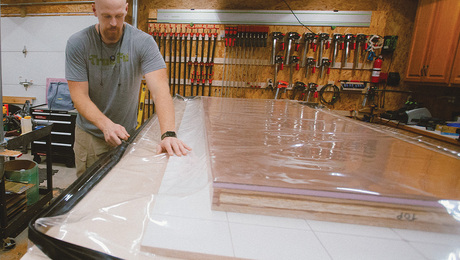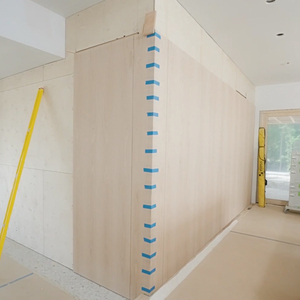Ok, I just had a debate with the guys I am working with. It started with them using the old style white painted aluminum nails for facia. I made the comment that they should get up to date with the times and use the painted stainless steel ones. They are better on every front. thinner shank, sharper point. they won’t just crumple if the wood has a hard spot like the aluminum ones, etc. etc.
Obviously the only reason they are still using the aluminum ones is because they are like most people in the field; they don’t like to try anything new or different. I have certainly been guilty of that before. When I was trying to convince them that SS were the “way to go” these days, they finally came up with… “stainless steel will rust!”
I was flabergasted. I argued feebly for a little bit, but they stuck to their guns. “This close to the ocean, the salt air makes stainless steel rust. The new whachyacallit on our boat started rusting after just a couple of weeks.” I really didn’t have a response to that so I had to concede that point to them.
Now, I need to get some expert input here… What do you guys think? Have any of you ever heard of SS rusting? Are my buddies right? Or were they just grasping at straws? We’re in Florida, on the gulf coast, so there is certainly the saltwater factor here.



















Replies
I have seen SS rust, not the crumbly rust like you'd expect on iron, but more of a surface pitting kind of thing. I imagine it has everything to do with the actual alloy. I've also seen stainless that was magnetic...a surprise to me.
They might be right but they probably don't know why. You could be right, but you'd want the right alloy. How's that for riding the fence?
PJ
Everything will be okay in the end. If it's not okay, it's not the end.
There are all types/grades/alloys of stainless steel and some of the low grade ones can develop a film of rust.
If you look at nails for shingling they'll often list a second, better grade for seaside applications.
Hope this helps...Buic
Mark:
There are different grades of stainless steel. I used to be into boating and I can tell you that the boat parts market is being flooded with made in Taiwan/Indonesia/whatever parts that are of somewhat inferior quality - or at least with respect to the grades of SS they use.
A few grades that come to mind are 304 (the cheaop stuff) 316 and 317.
A Google yielded this:
http://www.azom.com/details.asp?ArticleID=470
With respect to both boat parts and nails, often the grade of SS will be stated. Also, with respect to boat parts, I noticed that cheaply manufactured SS parts begin to rust at the welds - but not after 2 weeks :-)
Personally I'd bet that 316 SS nails would last 3 or 4 times as long in a salt environment than aluminum nails.
Edited 11/11/2005 8:23 pm ET by Matt
I don't have a clue weather or not SS rusts but I'm just flabbergasted that you got a job already and have FRIENDS! <G>
What kind of job did you land?
Doug
There is no such a thing as "stainless steel". That's a misnomer. As long as it contains iron (Fe) it will rust. Period.
The most "stainless" grades still contain about 80% iron. Major ingredients are is chromium (Cr), Nickel (Ni)... The Cr molecules surround the Fe and protect it from corrosion. End of metallurgy lesson.
A better term is "rust resistant". The more of the other alloy goodies the more rust resistant, also the more $ because these metals are scarcer than Fe and cost more.
In any case, the cheapest SS is still better than aluminun or galv steel in fighting corrosion, especially next to salt water. Al doesn't have a chance. Guess as to why your guys are using Al is they're much cheaper than SS.
No expert here, just made it all up :-)
SS is more prone to " crevice corrosion " not rust. The most common alloys found are 304 and 316. Although I would love to sound like a genius, this article will give you enough ammo to make those aluminum guys head spin. SS will not rust if exposed to the elements. Starved of oxygen, Crevice Corrosion will make you wish for rust.
http://www.kastenmarine.com/mbqMetRef.pdf
. Generally, AISI types 410, 302, 304 and 305 stainless will provide excellent corrosion protection in most situations. However in direct saltwater or other high chloride atmospheres these alloys may pit and discolor. This may cause color to bleed through finishes and lead to streaking in the wood surrounding a nail or screw head. To prevent this from happening, AISI type 316 stainless fasteners are recommended for any application exposed to saltwater (including immersion).
http://www.manasquanfasteners.com/Stainless%20Steel%20Technical%20Data.htm
Thanks for all the informative responses guys! I knew I could count on you to help enlighten me. Now I do indeed have some cold (as steel) hard facts with which to arm myself for the inevitable monday morning " round two" of the debate.
Of course like in the Handyma'am plywood for roof repair thread, it would have been better to have already had the facts at my fingertips during thae initial argument. maybe someday my education will be complete, but until then I will continue to attend classes at the University of Taunton, breaktime campus.
" If I were a carpenter"
Edited 11/13/2005 9:31 am ET by Mark
a> your buddies are correct, use aluminum on aluminum, even if the SS are nice, the Al will corrode once the paint is gone off the ss nails.
b> re salt water. Decades ago worked on a hydrofoil boat at the aerospace Co. I work for. PH18-8 was the 'stainless'** alloy of choice for a strength, corrosion, etc trade. It turns a really funky brown, but does not lose strength or flake off. nor is as subject to stress corrosion. The attachment is made of 18-8, has been hanging off the back porch for 30 years, note the nice brown color, but no pitting. The clanger and chain are 1010 steel, lotta flaking rust on those.
** Read Stain LESS, not stainfree, etc. Pure gold, chromium, Pt, Os Palladium, etc are truly 'rustfree' or 'stainfree' . Ever notice that if you buy any; hydraulic cylinders, the cost is more related to the rod dia than anything else? High cost of Chromium.
BTW, 18-8 is heck to forge (or machine), just bending the triangle took yellow heat at the bend area.
View Image
Edited 11/13/2005 10:04 am ET by junkhound
JH...any chance you can make the picture BIGGER.........LOL
I can't even figure out what that is ..."
"dinnerbell triangle"
sorry about the size, just snapped a shot out the back door and pasted it. Still was dark out in PNW.
I've been around a lot of boats and saltwater. Never seen stainless fittings that were actually rusted, rusty looking stains, but not rust. What in the gosh darn golly have you done to Rez?
I would certainly use aluminum on aluminum as long as the lumber that the aluminum is covering has absolutely no iron ( i.e. nails, steel ) in it. From a scientific standpoint, The Aluminum has a coating on both sides to protect it from corrosion. However, you sink an aluminum nail into the wood behind it, and that wood has steel nearby, The aluminum would corrode faster than SS of any kind. Aluminum 6061 has an approximate potential for corrosion of .75 (more corrodible in galvanic series) than SS 304 also known as 18-8 ( 18 % chromium / 8 % nickel ) which in passive mode ( not starved from oxygen ) is .08 (less corrodible). 316 SS a.k.a 18-10-3 ( chromium/nickel/molybdenum ) is .05. I Think I am just trying to open up more cans of worms and opinions here, and I apologize. Might I suggest using white contact paper instead?.
As others have noted, SS can rust, more importantly though, it can cause other things to rust. Pair it with galvanized connectors and the reaction will cause the galvanized connectors to fail. Jamestown Distributing (boat building suppliers) are a good resource for info: 800-423-0030 http://www.jamestowndistributors.com
Here's what they say about SS grades:
http://www.jamestowndistributors.com/decoder_stainlessgrades.jsp
"Stainless Steel screws are the work horse for modern boatbuilding or exterior woodworking applications. They provide great corrosion resistance while remaining affordable. Hardened steel screws are more common in the woodworking environment but cannot be used in a corrosive environment. Stainless steel is available in a wide range of engineered grades, each with its own designation number and specific properties. Only a few grades of Stainless Steel are suitable for fasteners--those that can be cold headed easily and have adequate torsional and shear strengths. The 300 series stainless steels are the most popular -- "18-8" grades contain very little carbon, about 18% chromium and 8% nickel -- giving them good corrosion resistance. In our opinion, 304- and 305-series stainless steel is not that much of a step-up from 18-8. But, 316 series stainless contains molybdenum, which significantly increases corrosion resistance, strength and of course the cost.
Use Stainless Steel screws cautiously below the waterline. Stainless Steel Screws cannot be in an anaerobic environment. If the screw is immersed in "still water" with no oxygen the corrosion-resistant film, chromium oxide, will not be allowed to form. Without the chromium oxide film the screw will suffer from galvanic corrosion and eventual failure."
Here's what they say about compatible metals:
(the chart is color coded: http://www.jamestowndistributors.com/decoder_compmetals.jsp)
"Compatible Metals Finder
In an ideal world, we would be able to use one type of metal for the entire construction or project that we were working on. Unfortunately, it doesn't always work out this way. Because we live in this imperfect world, we have created this little table below to help you choose the best alternative or the most compatible metal for your application.
The metals closer together in this table can be used together. Metals farther apart should not be used together. For example, bronze and copper can be used together; aluminum and copper should not.
Mercury
Monel
Nickel
Bronze (silicon)
Copper
Brass (red)
Bronze (phosphor)
Tin
Lead
Steel (stainless)
Iron
Steel (mild)
Aluminum
Cadmium
Galvanized (iron and steel)
Zinc
Magnesium
Mark you're wrong on this one.
However, it has nothing to do with environment and everything to do with chemistry. Remember that class? What it is, is the transfer of electrons if my memory serves me right. In order to avoid oxidation, and the easiest way unless you're a chemist and you know which metals react with one another, is to use the same type of fastener with the metal in which you're using.
This is why joist hanger nails are galvanized like the hanger itself. Also why copper nails are used in both copper plumbing straps and copper flashing. And like you pointed out aluminum nails in aluminm stock. It isn't only for aesthethics.
Mike Gavrillen
Ocean State Builders, Inc.
Fine Custom Framing and Exterior Trim
"My only limit is your imagination."
I got some stainless hinges on my jeep that rusting, but then they are stainless plated and cheap plating at that.2+3=7
This is why joist hanger nails are galvanized like the hanger itself.
FWIW Simpsons tech rep suggested to me once using plastic washers when nailing joist hanger (G90 or whatever they call the non-ZMAX galvinization) with SS nails. I ended up chickening out and going with 1.5" HDG joist hanger nails (the issue was nails going into rim board and being exposed to moist basement air where they came out).
Now of course I worry about hangers installed with ordinary non-galvinized nails. And my favorite are metal (steel?) clamps for MC (aluminium) cable, screwed down with galvanized screws. Is that galvanized->steel->aluminium? I guess there needs to be significant moisture for bad things to happen....
I don't know if anyone makes SS nails out of 316L alloy. If they do, there's your safe bet not to rust.
Bruce
Between the mountains and the desert ...
> I don't know if anyone makes SS nails out of 316L alloy. If they do, there's your safe bet not to rust.
Try http://www.swansecure.com for SS nails in both 316 and the cheaper 304 alloys.
If your concern is staining, then galvanized nails are pretty much worthless. Driving them fractures the zinc on the heads. The water in latex paint will start them rusting even before it rains. My neighbor's back porch is all rust stains.
304 stainless works much better, no stain at all after the second wettest winter in LA history. 316 is mainly for salt exposure, here it's worthwhile if you can smell the ocean at the job site.
As with anything else of metal, note carefully the country of origin. I've had brass screws and steel channel locks from China that snapped. Metalurgy QC on stainless is unlikely to be any better.
-- J.S.
You're preaching to the choir ...
http://www.stainless-fasteners.com/commons.htm
http://www.mcfeelys.com/multiple.asp?productID=SD6-0620
http://www.jamestowndistributors.com/product;part;4347&TYPE=froogle
http://www.azom.com/details.asp?ArticleID=2382
http://www.stainless-steel-world.net/pdf/10011.pdf
http://www.assda.asn.au/asp/index.asp?pgid=17991&cid=34299&id=56951
http://info.lu.farmingdale.edu/depts/met/met205/stainless-steels.html
Bruce
Between the mountains and the desert ...
great list bruce! I'm still working out my suppliers - I'll look through the set you have here but offhand, you know a good place to buy SS fasteners for a Hitachi NV75AG? I'm having problems finding 3" nails.-s
Not even a tiny little clue, sorry. Your search will probably turn up anything I would find.Bruce
Between the mountains and the desert ...
I got stainless nails for my Hitachi from http://www.swansecure.com. But mine's a 90, not a 75. Collation angle and size range are the two things you have to match up.
-- J.S.
Yes: stainless will rust eventually, SS costs more, and they are grasping at straws.
I too like the SS nails because of strength issues - easier to drive in the knots. Theoretically, the aluminum will corrode at an an accelerated rate around the SS nail hole due to galvanic corrosion ( see nobelity list in a previous post); on a practical basis, I don't think there is any noticable "corrosion acceleration" unless the aluminum is wet all of the time.
Monel annular ring nails are available from boat building suppliers - they don't rust even below the waterline in salt water.
Jim
Never underestimate the value of a sharp pencil or good light.
I believe that we have proof that SS can theoretically rust. But, I have been around alot of SS in places like pulp mills, power plants, etc. I have noticed a slight whitish film on some SS, that I did atribute to oxidation. But I have never seen SS "rust" in a situation as benign as Al gutters. What I have seen in other SS "rust" situations, was surficial iron contamination on the SS fixture rusting. Brakes, benders, rollers, wire brushes, grinding wheels, etc, are all possible sources of contamination onto SS.
It seems possible that a nail making machine is very expensive, and a manufacturer would not want to buy one just for SS.
>> Monel annular ring nails are available from boat building suppliers - they don't rust even below the waterline in salt water
No kidding (and no offense either). But we're talking about steel here (ie stuff made mainly out of iron) for building purposes. Monel is about ~55% Ni, ~40% Cu, with at most only half a percent (0.5%) of iron. Flexible stuff, I've used it extensively as wire-line fishing for striped bass off Cape Cod. No stretch & no give (vs nylon), when hooked to a big fish, feels like you're pulling against a small car.
I also know for sure that gold brads (Au, available from jewelry suppliers) don't rust at all, never -as in Zero, guaranteed :->)
Oh, I forgot to mention one thing... regarding the "use aluminum nails with aluminum facia " suggestions. We are using vinyl soffitt and facia. Don't even get me started on that issue!!!!!
There comes a time when you just have to say to yourself... "it ain't my house!" and just let it go." If I were a carpenter"
What people often see on stainless steels which pass as "rust" is surface iron contamination on fabricated stainless steel articles. The thingamajig on buddy's boat which "rusted" probably was made in some weld shop where they were working with carbon steel or where they used steel wire brushes etc. This surface iron contamination can actually lead to pitting and other damage to the stainless steel's corrosion resistance if not removed by pickling in acid etc.
There are lots of grades of stainless steels, each with properties designed for certain uses. 304 and 316 stainless steel are both used for fasteners, and both are more than adequate for most non-immersed services in building construction. That said, chloride is stainless steel's Achilles' heel. Even a trace amount of chloride can cause highly-stressed stainless steel parts to crack, pit and fail, particularly if the parts are warm or hot. Not something you're going to be worried about when handling vinyl siding with stainless nails, but definitely a concern for people using 304SS rebar in a concrete roof structure over a swimming pool. 316 has molybdenum added to help resist chloride-induced corrosion.
I obviously haven't been looking hard enough. I have only inquired with a dozen or so distributors about monel ring nails. Can't find-em. Although I don't know if I really would have chose them over silicon bronze for fastening a few hundred lengths of strip planking on my boat. Who has the Monel Ring nails?
I haven't been spending much time lately here, but just came back to check on sources for fasteners for outside applications. Trying to do as much as I can on my renovations outside before it gets into freeziong weather. Yesterday I finished pouring the last couple footings/piers for an enclosed porch redo. Just in time, some snow expected in Boston for turkey day .
Found the great list of suppliers that Bruce posted. Thanks, will be checking these out.
WRT to Monel ring nails. My understanding of Monel it is a soft alloy (when compared to steel), as I mentioned my experience with it is for wire fishing line. Very fexible stuff. Very expensive too. I never heard of ring nails (or any nails) made of it, not saying they don't exist. But if they did you probably would have found them. Si-bronze for wooden boat building has stood the test of time and is widely available as you already know. It also has a natural pest repellent characteristic (because of the Cu)
Not really " building" application, we're talking about a replacement for aluminum nails for attaching fascia wrapping materials like vinyl ( see post 1).
I used to buy them at the Mahogany Company in Mays Landing, NJ.; have seen them advertised from various suppliers in the classified section of The National Fisherman.
Jim
Never underestimate the value of a sharp pencil or good light.
Nails are commonly the 304 or 316 series. 304 is the run-of-the-mill variety of SS. Surface discoloration (rusting) will appear under normal circumstances. If you really want to have no rust stains, then 316 is your best bet. A little bit more pricey than 304 but in the long run it will solve the problem.
butch
Stainless steel does not = rust free, essentially is rusts less than other metals
And as previous poster had mentioned there are varying grades of ss
-----------------------------------------------------------------------------
WWPD